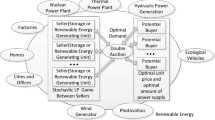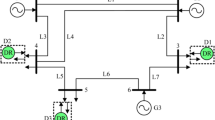Abstract
The continuous expansion of renewable energy sources and their ongoing integration into existing power networks, alongside the emergence of new types of loads, has led to significant new challenges emerging for power grid source–load coordination scheduling in recent years. To fully harness the demand response (DR) potential of the load side of such systems, this paper proposes an optimal scheduling method based on DR and the Stackelberg game. A Stackelberg game model is established to formulate day-ahead source–load coordinated scheduling problem, taking account of the stochastic dynamic characteristics of the load response process and user electricity consumption satisfaction with electricity consumption. The model is essentially a strongly nonlinear optimization problem, however; thus, to avoid several of the limitations seen in traditional optimization methods, a data-model fusion-driven method is proposed, with electricity prices formulated by the data-driven method used as input for a model-driven method whose output is then used in turn to guide a data-driven formulation of electricity prices. Case studies on IEEE test systems are used to verify the feasibility and accuracy of the proposed method.

Source–load coordination scheduling system











Similar content being viewed by others
References
Lu ZX, Li HB, Qiao Y (2017) Flexibility evaluation and supply/demand balance principle of power system with high-penetration renewable electricity. Proc CSEE 37(01):9–20
Xie L, Carvalho PMS, Ferreira LAFM, Liu JH, Krogh BH, Popli N, Ilićet MD (2011) Wind integration in power systems: operational challenges and possible solutions. Proc IEEE 99(1):214–232
Wang XF, Xiao YP, Wang XL (2014) Study and analysis on supply-demand interaction of power system under new circumstances. Proceedings of the CSEE 34(29):5018–5028
Du P (2019) Ensemble machine learning-based wind forecasting to combine NWP output with data from weather station. IEEE Trans Sustain Energy 10(4):2133–2141
Wang S, Zhao X, Wang H, LI M (2020) Small-world neural network and its performance for wind power fore-casting. CSEE J Power Energy Syst 6(2):362–373
Tuohy A, Meibom P, Denny E, O’malley M (2009) Unit commitment for systems with significant wind penetration. IEEE Trans Power Syst 24(2):592–601
Isuru M, Hotz M, Gooi HB, Utschickb W (2019) Network-constrained thermal unit commitment for hybrid AC/DC transmission grids under wind power uncertainty. Appl Energy 258:114031
Yang N, Wang B, Liu DC, Zhao J, Wang H (2013) An integrated supply-demand stochastic optimization method considering large-scale wind power and flexible load. Proc CSEE 33(16):63–69
Wu H, Shahidehpour M, Al-abdulwahab A (2013) Hourly demand response in day-ahead scheduling for managing the variability of renewable energy. IET Gener Transm Distrib 7(3):226–234
Bie CH, Hu GW, Xie HP, Li GF (2014) Optimal dispatch for wind power integrated systems considering demand response. Autom Electr Power Syst 38(13):115–120
Zeng D, Yao JG, Yang SC, Wang K, Zhou J, Li YP (2014) Optimization dispatch modeling for price-based demand response considering security constraints to accommodate the wind power. Proc CSEE 34(31):5571–5578
Cheng YG, Zhang X, Luo G, Bai Y, Tan ZF, Zhong HW (2019) Demand response mechanism and approach of electricity spot market in bidding mode without price on user side. Autom Electr Power Syst 43(09):179–186
Luo CJ, Li YW, Xu HP, Li LX, Hou TT, Miao SH (2017) Influence of demand response uncertainty on day-ahead optimization dispatching. Autom Electr Power Syst 41(05):22–29
Wang BB, Liu XC, Li Y (2013) Day-ahead generation scheduling and operation simulation considering demand response in large-capacity wind power integrated systems. Proc CSEE 33(22):35–44
Zhang ML, Hu ZJ, Li Y, Xie SW (2018) A robust optimization method for unit commitment considering wind power and demand response based on feasibility testing. Proc CSEE 38(11):3184–3194
Liu XC, Wang BB, Li Y, Wang K (2015) Stochastic unit commitment model for high wind power integration considering demand side resources. Proc CSEE 35(14):3714–3723
Xu J, Cao HQ, Tang CH, Wei CY, Jiang HY, Liao SY (2018) Optimal dispatch of power system considering uncertainty of demand response based on extended sequence operation. Autom Electr Power Syst 42(13):152–160
Cui Y, Zhang JR, Wang Z, Wang T, Zhao YT (2020) Day-ahead scheduling strategy of Wind-PV-CSP hybrid power generation system by considering PDR. Proc CSEE 40(10):3103–3114
Ye YJ, Qiu DW, Sun MY, Papadaskalopoulos D, Strbac G (2020) Deep reinforcement learning for strategic bidding in electricity markets. IEEE Trans Smart Grid 11(2):1343–1355
Sun Y, Liu D, Li B, Xu YH (2019) Application of deep reinforcement learning in demand response. Autom Electr Power Syst 43(5):183–191
Zhang YF, Ai Q, Li ZY (2020) Intelligent demand response resource trading using deep reinforcement learning. CSEE J Power Energy Syst. https://doi.org/10.17775/CSEEJPES.2020.05540
Zhang QZ, Dehghanpour K, Wang ZY, Huang QH (2020) A learning-based power management method for networked microgrids under incomplete information. IEEE Trans Smart Grid 11(2):1193–1204
Du Y, Li FX (2020) Intelligent multi-microgrid energy management based on deep neural network and model-free reinforcement learning. IEEE Trans Smart Grid 11(2):1066–1076
Lei L, Tan Y, Dahlenburg G, Xiang W, Zheng K (2020) Dynamic energy dispatch in isolated microgrids based on deep reinforcement learning. arXiv:2002.02581
Li P, Wu DF, Li YW, Liu HT, Wang N, Zhou XC (2021) Optimal dispatch of multi-microgrids integrated energy system based on integrated demand response and stackelberg game. Proc CSEE 41(04):1307–1321
Gu J, Bai KF, Shi YJ (2019) Optimized operation of regional integrated energy system based on multi-agent master-slave game optimization interaction mechanism. Power Syst Technol 43(09):3119–3134
Wu LL, Jing ZX, Wu QH, Deng S (2018) Equilibrium strategies for integrated energy systems based on stackelberg game model. Autom Electr Power Syst 42(04):142–150, 207
Yang Z, Peng SC, Liao QF, Liu DC, Xu YY, Zhang YJ (2018) Noncooperative trading method for three market entities in integrated community energy system. Autom Electr Power Syst 42(14):32–39, 47
Rahi GE, Etesami SR, Saad W, Mandayam NB, Poor HV (2019) Managing price uncertainty in prosumer-centric energy trading: a prospect-theoretic stackelberg game approach. IEEE Trans Smart Grid 10(1):702–713
Liu ZP, Wen FS, Xue YS, Xin JB (2011) Optimal siting and sizing of distributed generators considering plug in electric vehicles. Autom Electr Power Syst 35(18):11–16
Saaty TL (2004) Decision making-the analytic hierarchy and network processes (AHP/Anp). J Syst Sci Syst Eng 13(1):1–35
Feng C, Wang Y, Zheng KD, Chen QX (2020) Smart meter data-driven customizing price design for retailers. IEEE Trans Smart Grid 11(3):2043–2054
Acknowledgements
The work was supported by Natural Science Foundation of Anhui Province, PR China (2108085UD01), and the National Natural Science Foundation of China (No. 62273130).
Author information
Authors and Affiliations
Corresponding authors
Additional information
Publisher's Note
Springer Nature remains neutral with regard to jurisdictional claims in published maps and institutional affiliations.
Rights and permissions
Springer Nature or its licensor (e.g. a society or other partner) holds exclusive rights to this article under a publishing agreement with the author(s) or other rightsholder(s); author self-archiving of the accepted manuscript version of this article is solely governed by the terms of such publishing agreement and applicable law.
About this article
Cite this article
Yuan, X., Tang, H., Liu, X. et al. A Day-Ahead Optimization Method of Source–Load Coordination for Power System Using Demand Response and Stackelberg Game. J. Electr. Eng. Technol. 19, 1191–1203 (2024). https://doi.org/10.1007/s42835-023-01651-4
Received:
Revised:
Accepted:
Published:
Issue Date:
DOI: https://doi.org/10.1007/s42835-023-01651-4




